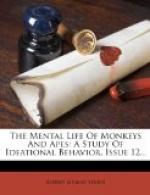Problem 2. Second from the Right End
Julius was given four days’ rest before being presented with problem 2. He was occasionally fed in the apparatus, but regular continuation of training was not necessary to keep him in good form. During this rest interval, locks were attached to the doors of the apparatus so that the experimenter by moving a lever directly in front of him could fasten either one or both of the doors of a given box by a single movement. On May 13 Julius was given opportunity to obtain food from each of the boxes in turn, and trial of the locks was made in order to familiarize him with the new situation. He very quickly discovered that the doors could not be raised when closed, and after two days of preliminary work, he practically abandoned his formerly persistent efforts to open them. The locks worked satisfactorily from a mechanical point of view as well as from that of the adaptation of the animal to the modified situation.
Problem 2 was regularly presented for the first time on May 17, on which day a single series was given. The period of punishment adopted was twenty seconds, and for each successful choice a small piece of banana was given as a reward. After the first trial in this series, in which Julius repeatedly entered the first box at the left, that is box 7, there was but slight tendency to reenter the first box at the left of the group. Instead, Julius developed the method of moving box by box toward the right end of the group. The choices were made promptly, and their systematic character enabled the animal to obtain his reward fairly quickly, in spite of the large number of mistakes.
In the second series, the orang utan developed the interesting trick of quickly dodging out of the wrong box before the experimenter could lower the door behind him. This he did only after having been punished for many wrong choices to the point of discouragement. The trick was easily broken up by the sudden lowering of the entrance door as soon as he had passed under it.
There appeared on May 21 an unfavorable physical condition which manifested itself, first of all through the eyes which appeared dull and bloodshot. On the following day they were inflamed and the lids nearly closed. Julius refused to eat, and experimentation was impossible. Until June 2 careful treatment and regulation of diet was necessary. He passed through what at the time seemed a rather startling condition, but rapidly regained his usual good health, and on June 3, although somewhat weak and listless, he again worked fairly steadily.




